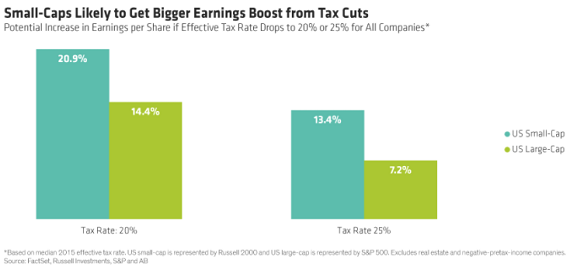Will Tax Cuts Yield A Small-Cap Windfall?
 Congress is getting down to tax reform, and at first blush, smaller companies seem poised for a windfall. But tax cuts shouldn’t anchor a broad-brush investing strategy. Instead, focus on individual company fundamentals—and the less obvious effects of the evolving legislation.
Congress is getting down to tax reform, and at first blush, smaller companies seem poised for a windfall. But tax cuts shouldn’t anchor a broad-brush investing strategy. Instead, focus on individual company fundamentals—and the less obvious effects of the evolving legislation.
Sentiment toward smaller stocks has been fickle. After last year’s elections, expectations that the Trump administration would adopt a probusiness economic policy agenda provided a boost. But this year, policy uncertainty has set the tone. The small- and mid-cap Russell 2500 Index advanced by 12.7% through October 31, about three-quarters of the gains of the broader market.
Bigger Benefits for Smaller Companies
Could progress on tax reform revive investor appetites? The reform’s proposed slashing of corporate tax rates to 20% from 35% looks especially advantageous for smaller companies. That’s because small-cap companies often pay higher effective tax rates than larger peers.
We estimated at the end of last year that smaller companies’ earnings per share could increase by 13.4%—nearly double the expected bump for the earnings of larger-cap companies—if the corporate tax rate drops to 25% (Display). For smaller companies that pay close to the full corporate tax rate, bottom-line net income could rise by as much as 20 percent if the rate comes down to 20%.

A Work in Progress
But tax-inspired exuberance remains premature at this point. Even after the tax bill was approved on November 16 by the House, it’s impossible to say how the final version will look. At this stage, the Senate and House versions of the bill contain different start dates for the new corporate tax rate to take effect. What’s more, the entire reform package might fail to muster a majority in the Senate, leaving corporate tax rates unchanged.
We believe that a careful and nuanced analysis of tax reform is the call of the hour. Lowering corporate tax rates won’t affect all companies uniformly or translate into a fundamental boost to every business.
Instead, small-cap investors should consider how second-order effects of the reform might impact individual businesses. The following examples highlight the potentially complex influences of tax reform that are worth keeping in mind as the debate continues.
Catalyst for Technology Investment
Many investors anticipate that the reform will be a bonanza for highly profitable technology multinationals, particularly those with large offshore cash hoards. For small-cap tech companies, the impact will be more indirect.
Because many of these businesses aren’t profitable yet, they don’t pay any corporate taxes and won’t benefit directly from a rate reduction. That said, if incentives are provided for companies to step up their IT infrastructure spending, smaller-cap technology companies could stand to benefit from stronger demand for their products because capital expenditures will be immediately expensed instead of amortized.
Cash for M&A and Buybacks
Tax reform could prompt takeover activity. A tax cut and holiday for the repatriation of corporate profits held overseas will add to companies’ resources for deals in the US.
Such a buying spree would disproportionally favor smaller companies, in our view. Small-cap members of the benchmark Russell 2000 Index have been the target of more than three-fourths of the M&A transactions over the last 23 years. Members of the small- and mid-cap Russell 2500 benchmark have attracted 91% of the activity (Display). Biotech companies could be especially attractive targets.

Beyond M&A, freeing up cash could provide smaller companies with greater scope to increase share buybacks and dividends.
Margin Pressure on Banks
On the surface, banks appear to be another big winner from the reform because they pay very high tax rates today. Many investors expect that banks will capture much of these tax savings, thereby boosting their net income significantly.
But this optimism might be overdone in some cases. Since the banking system is awash with capital, lending has become more competitive. As a result, we think many banks are likely to give away a lot of their tax savings to customers in the form of lower prices, which amounts to tighter loan spreads—and lower profitability.
Existing loan books will benefit because pricing was fixed at a higher tax rate. But we expect new business to be repriced lower quickly. Buying blanket exposure to smaller banks through an index is very risky, in our view. Instead, investors should search for banks with solid business models in the current competitive environment that could also benefit further from tax reform.
Impact on Individual Companies Will Differ
It’s still unclear exactly where the Republican tax reform proposals will lead, even though legislation is finally making its way through Congress. What is clear is that the expected boost for smaller companies won’t be uniform across the entire asset class.
Tax cuts shouldn’t be a guiding principle of an investment thesis. Sizing up the impact on small-cap companies calls for an intimate knowledge of how a tax overhaul would impact their businesses, balance sheets and earnings outlooks. A bottom-up analysis charts a better path to reaping the maximum benefits of any tax reform.
The views expressed herein do not constitute research, investment advice or trade recommendations and do not necessarily represent the views of all AB portfolio-management teams.
Note: Article was contributed to ValueWalk.com by Bruce Aronow, James MacGregor, Shri Singhvi, Samantha S. Lau – Alliance Bernstein
Category: Small-Cap Stocks




